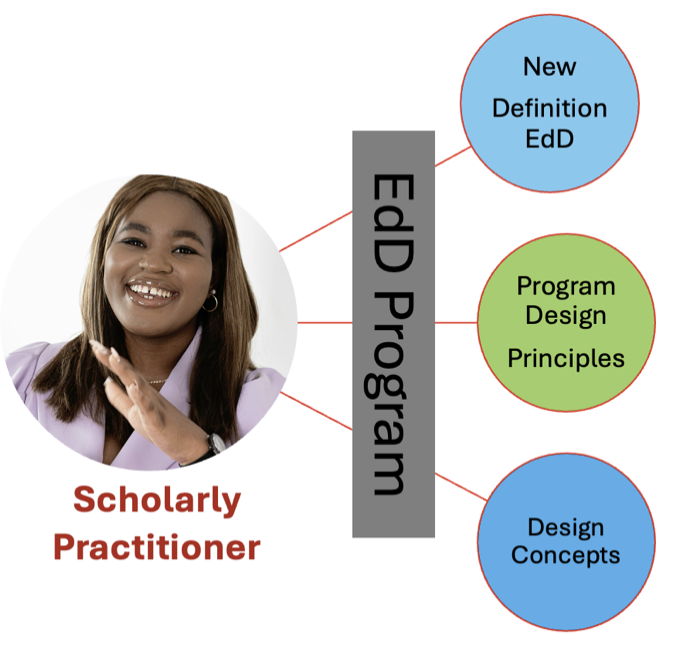
What is CPED?
The Carnegie Project on the Education Doctorate, known as CPED (pronounced C-ped), was launched in 2007 by the Carnegie Foundation to distinguish and redesign the Education Doctorate (EdD) as a professional practice doctorate that prepares educators to lead change in their field. CPED was inspired by Shulman et al’s (2006) article Reclaiming Education’s Doctorates: A Critique and a Proposal, which distinguished preparation for those who wish to remain in educational practice and who seek a doctorate to give them skills, knowledge, and dispositions to become transformational leaders. Since 2007, starting with 25 member universities, a grassroots collaborative effort of education faculty have come together to distinguish and improve the EdD to make it a professional degree that prepares practitioners to become transformation leaders who know how to use research and inquiry to improve education in PK-20 settings and beyond. CPED now has over 150 universities in three countries who have joined the charge of improving preparation for educational leaders.
Through this collaboration of member faculty, CPED developed a Framework that includes this definition as well as six guiding principles for program design, and seven design concepts that distinguish the coursework and milestones undertaken in EdD programs. This Framework guides CPED-influenced EdD programs in the creation of student learning outcomes and program components.
CPED defines the EdD as “The professional doctorate in education that prepares educators for the application of appropriate and specific practices, the generation of new knowledge, and for the stewardship of the profession.”
What distinguished a CPED-influenced EdD?
Educational leaders typically return to doctoral study while they are still working in practice. They are generally older, have families and active lives, and cannot leave these to enter a doctoral program. These practitioners are extremely skilled in practice and hold a tremendous amount of professional knowledge. CPED recognizes these highly qualified practitioners need appropriate training and skills that can advance their leadership, respect their practitioner knowledge, and support them in attaining a doctorate while remaining in practice. Guided by the CPED Framework, EdD programs generally are:
The last three points speak to key distinction of the CPED-influenced EdD—programs are designed to prepare practitioners to become a Scholarly Practitioner or one who:
BLENDS practical wisdom with professional skills and knowledge to name, frame, and solve problems of practice;
USES practical research and applied theories as tools for change;
DISSEMINATES their work in multiple ways;
RESOLVES problems of practice by collaborating with key stakeholders, including the university, the educational institution, the community, and individuals.

Why an EdD?
Over the last century, the EdD was deeply confused with the Doctor of Philosophy in education (PhD) where some institutions defined it as the research doctorate in education and others defined it as a practitioner degree with fewer requirements and less rigorous research training. This confusion resulted in the EdD being defined as a “PhD-lite.”
Since its inception in 2007, CPED and its members have worked hard to redefine the programmatic content of EdD programs to ensure they are focused on the skills, knowledge, and dispositions that practitioners need. The Council of Graduate Schools Task Force on the Professional Doctorate (2007) noted, “a professional degree should represent the preparation for the potential transformation of that field of professional practice, just as the PhD represents preparation for the potential transformation of the basic knowledge of a discipline” (p. 9). CPED and its members have redesigned the EdD to give students the skills needed to transform the field of educational practice.
Practitioners who enroll in the EdD:
If your goals are not similar to these, the EdD might not be the right terminal degree for you. That is, if you want to transition to academia to become a tenured professor or seek to become a researcher, then you might consider the PhD in education which focuses on developing skills to generate new educational knowledge, to seek grant funding, and to teach in higher education.
For comparison, consider the Doctor of Medicine (MD) versus a Biochemist who holds a PhD. An MD is a practitioner who works in the field with patients and who consumes research articles to inform their practice and may do research to understand localized outbreaks or medical issues. Whereas a PhD in Biochemistry works in a laboratory investigating medical advancements or cures and does not interact with patients unless they are part of a clinical trial. Their work gets published in medical journals.
“My EdD program has provided me with the tools needed to effectively conduct and analyze research into manageable and understandable ideas that have helped me to improve education for the students, while also providing practical application for our educational needs within our community.” Anna, Boston College
How CPED Can Support EdD Students & Graduates
Though CPED has largely been a network to support school and college of education faculty in EdD program design, our mission is to transform the advanced preparation of educational professionals to lead through scholarly practice for the improvement of individuals and communities.
To that end, we are building our support for future and current EdD students and graduates. Our aim is to build a knowledge base to support professional practitioners in selecting, participating in, and completing their professional practice degree, the EdD.
Additionally, we are in the process of developing a professional organization to network EdD students and graduates. Stay Tuned!
In the meantime, follow us on:
If you have a suggestion of what materials should be added to these pages, please share with us at [email protected]
|